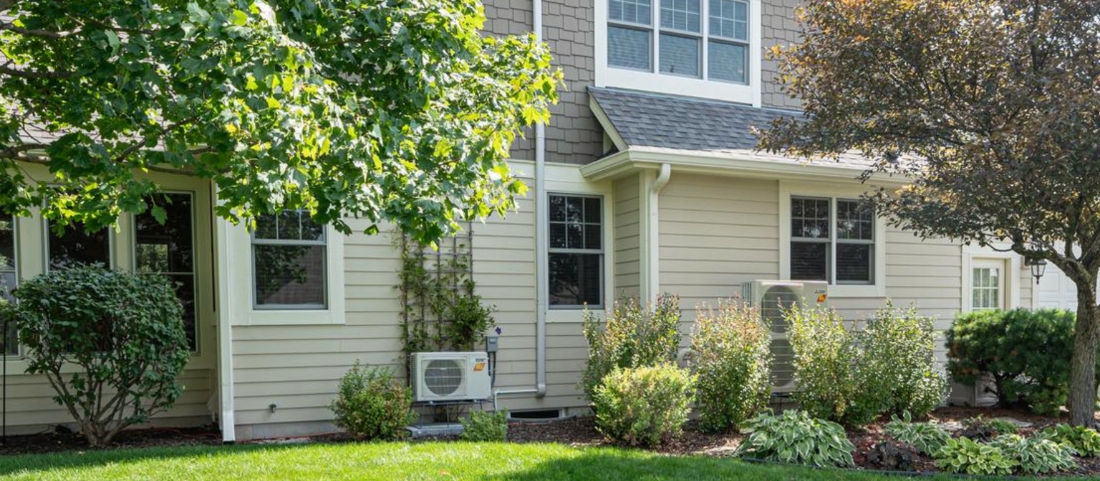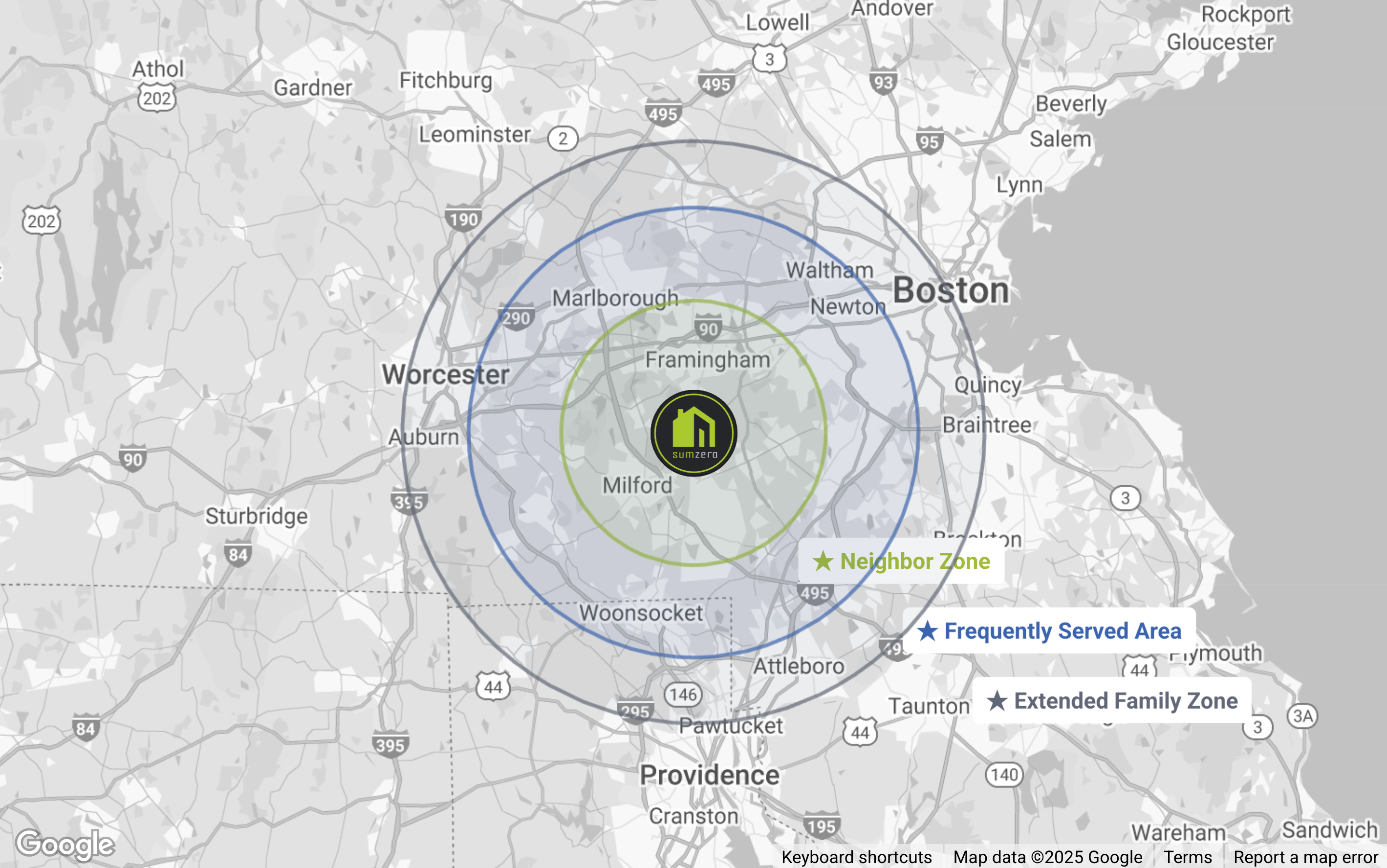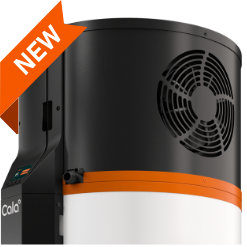Gas to Heat Pump Conversion | Lancaster, MA
Convert gas to heat pump in Lancaster MA for an energy-efficient upgrade that lowers utility bills and reduces your carbon footprint. Replacing your gas furnace with a heat pump offers consistent comfort year-round while eliminating the need for fossil fuels in your home's heating system.

Why Convert Gas to Heat Pump in Lancaster MA for Efficient Heating
Lancaster, Massachusetts, experiences a wide range of seasonal temperatures, from brisk winters to warm, humid summers. For homeowners relying on traditional gas furnaces, this can mean high heating costs during the colder months and inefficient comfort throughout the year. More and more residents are exploring ways to upgrade their systems for better energy efficiency, year-round indoor comfort, and reduced environmental impact. That's where converting from gas to a heat pump system becomes a smart choice for Lancaster homeowners.
The town’s typical colonial and Cape Cod-style homes often feature aging heating setups that are not optimized for today’s energy needs. With local incentives available through programs like Mass Save, there's never been a better time to consider this transition. Upgrading to a heat pump makes your home more resilient, offers superior climate control, and unlocks substantial long-term savings.
“With heating bills climbing and winters getting harsher, switching to a heat pump in Lancaster isn’t just a trend—it’s a smart investment for comfort and sustainability.”
Gas to Heat Pump: A Cleaner, Smarter Heating Choice for Lancaster Homes
Switching from a natural gas system to a high-efficiency heat pump reduces fossil fuel dependency and offers year-round climate flexibility. For Lancaster homeowners, this means not only lower utility bills but also contributing to Massachusetts' clean energy goals.
Understanding the Benefits of Heat Pumps
Heat pumps work differently from traditional gas furnaces. They don’t create heat—they move it. In the winter, they draw heat from outside air and circulate it indoors. In the summer, they remove indoor heat to cool your home. This efficient method makes them a dual-purpose solution ideal for Lancaster’s climate.
Key advantages include:
- Lower monthly energy bills
- Improved indoor temperature control
- Reduced greenhouse gas emissions
- Compatibility with both new and existing homes
Local Rebates and Incentives for Lancaster Homeowners
Massachusetts offers significant support for those choosing to ditch gas heating. Through the Mass Save program, residents in Lancaster can receive rebates of up to $10,000 for installing air source heat pump systems. Additionally, income-based incentives are available for qualified homeowners, making upgrades more affordable.
“Mass Save rebates helped me cover most of the costs for my heat pump system—it was an easy decision once I saw the long-term savings and the comfort it brings,” says a Lancaster homeowner.
Fueling the Transition: Why Lancaster Is Ready
Lancaster is part of a statewide initiative to reduce reliance on fossil fuels. According to the Massachusetts Clean Energy Center, electrifying home heating through ducted heat pump systems helps reach long-term sustainability goals. With aging gas infrastructure and increasing utility costs, it makes practical sense to modernize.
Replace Gas Furnace with Heat Pump in Lancaster: What You Need to Know
If you’re considering replacing your gas furnace with a heat pump system, understanding local conditions and home requirements is key. Lancaster homes are often suited for retrofits that easily accommodate modern HVAC solutions.
Evaluating Your Home for Heat Pump Compatibility
Many homes in Lancaster MA are ideal candidates for heat pump retrofits. Whether you live in a recently built colonial or a 100-year-old farmhouse, a professional evaluation will determine the best setup—whether that's a ducted heat pump system or a hybrid system to maximize flexibility and comfort.
Things that professionals assess include:
- Current ductwork layout
- Home insulation and air sealing
- Size and layout of the home
- Electrical panel capacity
Choosing Between Full Electric and Hybrid Systems
Some Lancaster homeowners may benefit from a hybrid system, which combines a gas furnace with a heat pump. This approach lets you use the heat pump for the majority of the year and fall back on gas only during the coldest days. It's a good transitional option if your home's electrical system isn’t ready for full electrification right away.
Using a hybrid system also allows you to:
- Improve efficiency over time
- Stay within budget while upgrading
- Maintain reliable backup heating during extreme conditions
Common Installation Questions in Lancaster MA
Homeowners often wonder about timelines, integrations, and how interior temperatures are maintained. A typical heat pump installation in Lancaster takes 1–3 days, depending on the complexity. Existing ductwork can often be reused, and programmable thermostats allow for room-by-room control.
Installers will:
- Secure necessary permits
- Optimize airflow settings
- Walk you through system diagnostics
- Ensure Mass Save paperwork is submitted properly
Convert Gas to Heat Pump: Why Now Is the Time in Lancaster MA
Making the change from gas to a heat pump isn’t just about cutting energy costs—it’s about future-proofing your home. With volatile energy prices and aging gas infrastructure, heat pumps offer reliable, efficient climate control for all seasons.
Adapting to Lancaster’s Seasonal Climate
Lancaster experiences winter lows in the teens and summer highs in the mid-80s. Cold-climate air source heat pump models are more than capable of providing consistent, efficient warmth even during harsh New England winters.
Technological advancements mean that even in temperatures below freezing, heat pumps still perform better than many think.
"Today's cold-climate heat pumps can efficiently heat homes in Lancaster—even when it’s 5°F outside. These systems are getting smarter and more powerful every year."
Energy Savings Over Time
The switch to a heat pump can cut your home's heating energy use by 30–60%. That translates to hundreds, if not thousands, of dollars saved annually on utility bills. Additionally, maintenance costs are often lower, and the system offers heating and cooling in one integrated unit.
Lancaster residents who’ve made the switch often report:
- Immediate difference in indoor comfort
- Year-round temperature control
- Quieter operation compared to furnaces or window AC units
Savings become even more noticeable when paired with energy-efficient insulation, smart thermostats, and local energy audits.
Cleaner Home, Cleaner Air
By moving away from gas combustion inside the home, you're eliminating carbon monoxide risks and improving indoor air quality. This is especially beneficial for families with respiratory conditions or allergies. The air source heat pump units filter and circulate air continuously, balancing humidity and temperature in a safer way.
Choosing the Right Heat Pump System for Your Lancaster Home
Heat pump systems come in various styles and configurations, depending on your home’s layout and preferences. From whole-home ducted heat pump solutions to room-by-room mini-split systems, there’s a match for every residence.
Ducted vs. Ductless Systems
A ducted heat pump system uses your existing ducts to distribute air throughout the home and is often ideal for replacing a central gas furnace. Ductless systems use slim indoor units and are perfect for additions, older homes, or spaces without ducts.
Key considerations:
- Duct compatibility
- Home zoning requirements
- Aesthetic preferences
- Installation size and location
Single-Zone vs. Multi-Zone Options
Single-zone systems are ideal for heating or cooling a specific area of your Lancaster home, such as an in-law suite or home office. Multi-zone units allow different settings for multiple rooms, offering tailored comfort and efficiency.
Whether you need a flexible solution or full-home heating, your installer will factor in:
- Room usage patterns
- Distance from outdoor units
- Insulation quality
- Placement for optimal airflow
Where the Heat Pump Goes Matters
Outdoor heat pump units should be placed away from heavy snow accumulation zones and close to indoor entry points for minimal energy loss. Indoor heads (in ductless systems) can be wall-mounted, floor-mounted, or even recessed into ceilings depending on style and space.
Best practices in Lancaster include:
- Elevating outdoor compressors in case of snow
- Shielding from drainage issues
- Choosing spots with good air circulation
- Avoiding placement near plumbing vents
Lancaster Is Taking the Lead: Heat Pumps and Massachusetts Climate Goals
Massachusetts is one of the most proactive states when it comes to reducing carbon emissions. Lancaster homeowners who install high-efficiency systems—like air source heat pumps—are directly contributing to these state-level goals.
According to the EPA, heating accounts for nearly 42% of energy use in homes across cold regions like New England. Switching to more efficient technology can significantly reduce this footprint.
“By converting from gas to an electric heat pump, Lancaster homeowners aren’t just improving comfort—they’re joining a larger movement to make Massachusetts homes safer, cleaner, and more resilient.” EPA Residential Energy Use Guide
Summary: Lancaster MA’s Smart Move from Gas to Heat Pump
In Lancaster, where seasonal extremes are predictable but your utility bills shouldn't be, switching from gas to a heat pump offers a smart, local answer to heating inefficiencies. From leveraging Mass Save rebates to choosing custom ducted heat pump or hybrid system installations, homeowners can anticipate a cleaner, quieter, and more cost-effective future.
With heat pumps, you're not just upgrading your equipment—you’re investing in long-term comfort, health, and energy independence.
What Local Homeowners Are Saying
See how SumZero has helped local homeowners stay comfortable year-round with energy-efficient heat pump solutions.
Not Sure Where to Start? We’ll Guide You
Let our experts design the right heating and cooling solution—customized for your comfort, your layout, and your energy goals. No pressure. Just clarity.
Request FREE ESTIMATE












